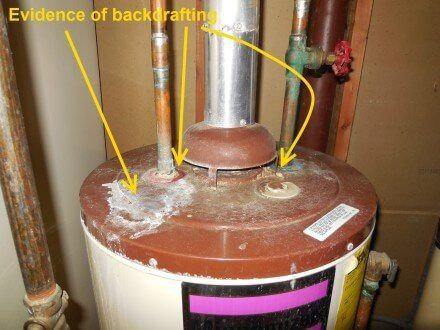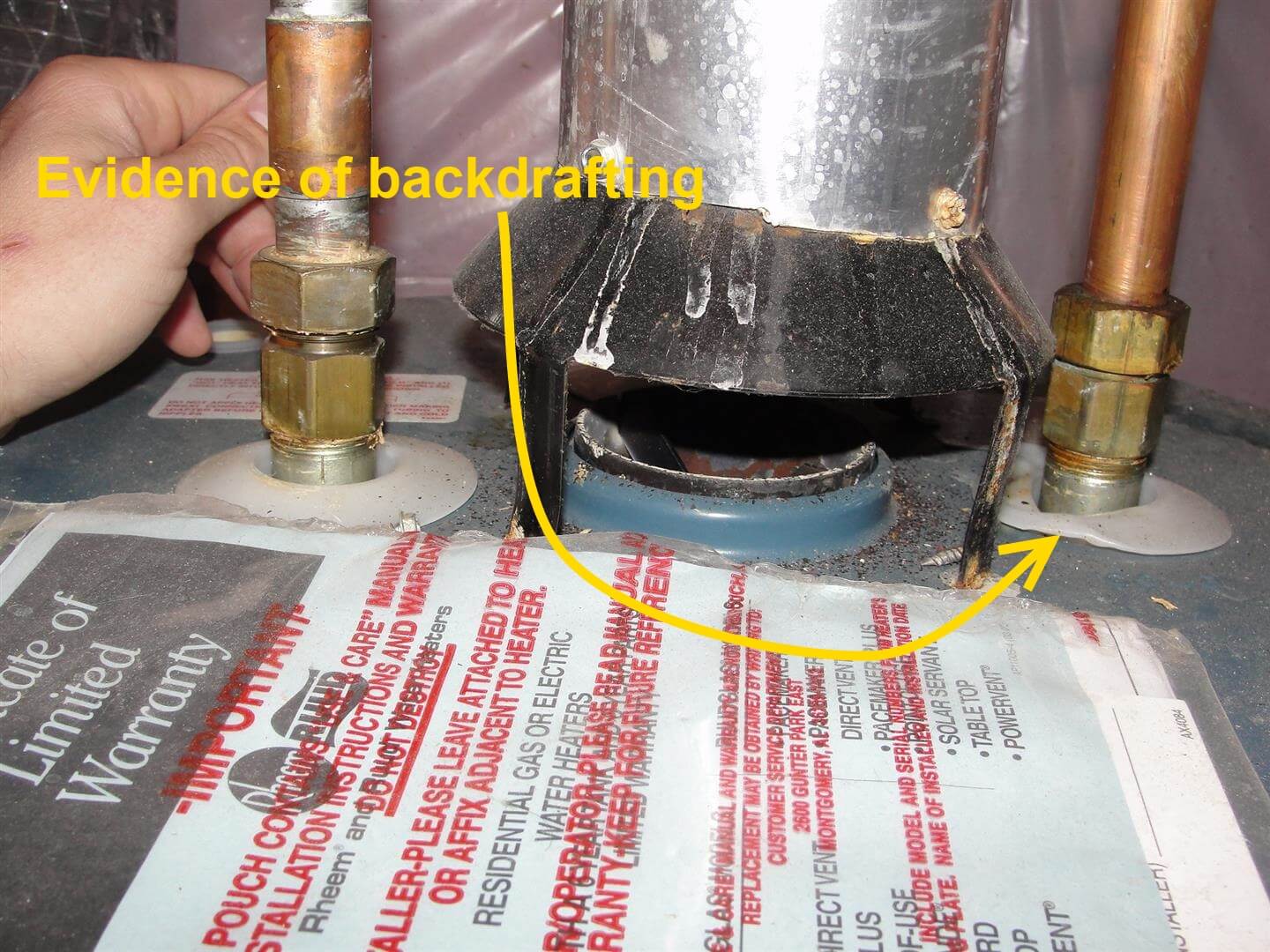A water heater leaking from the vent collar often indicates a problem with the flue or condensation. Immediate inspection is crucial to prevent further damage.
Water heater issues can disrupt your daily routine and lead to costly repairs. One common problem homeowners face is a leak from the vent collar. This area connects the water heater to the venting system, allowing exhaust gases to escape.
A leak can compromise efficiency and safety, leading to potential health risks. Understanding the causes of this leak is essential for timely repairs. Regular maintenance and inspections can help identify issues before they escalate. Taking prompt action not only ensures your water heater operates effectively but also extends its lifespan. Stay informed to keep your home safe and efficient.
Page Contents
Identifying The Leak
Start with a visual inspection of the water heater. Look for any drips or puddles near the vent collar. Check the connections for rust or corrosion. These signs often mean a leak is present.
Common signs of leakage include:
- Water stains around the vent collar
- Dampness on the floor
- Mold or mildew growth nearby
- Unusual noises from the heater
Early detection helps prevent further damage. Regular inspections can save you from costly repairs.
Safety First
Safety is the top priority when dealing with a water heater leak. Start by shutting down the power. This prevents any accidents or injuries. For electric water heaters, turn off the circuit breaker. For gas heaters, turn the gas valve to the “off” position.
Keep in mind that both types of heaters have specific precautions. Electric heaters must be completely disconnected from the power source. Gas heaters require careful handling of the gas line. Always ensure the area is well-ventilated. This helps reduce any risks associated with gas leaks.
Initial Troubleshooting
Start by checking the pressure relief valve. This valve helps release excess pressure. If it’s leaking, it may need replacing. Make sure it operates properly.
Next, inspect the temperature settings. A setting too high can cause leaks. Aim for a safe temperature, usually around 120°F (49°C). Lowering the temperature can prevent overheating.
Look for any visible signs of leakage around the valve and collar. Water can drip down from the vent collar. A small amount of moisture may not indicate a serious problem.
If issues persist, consult a professional. Regular maintenance can help avoid future leaks.

Credit: www.timrauschplumbing.com
Causes Of Vent Collar Leaks
Damaged seals and gaskets can cause water heater leaks. These parts can wear out over time. When seals are broken, water escapes easily. Regular checks can help find these issues.
Corrosion and wear can lead to leaks as well. Metal parts can rust and break down. This process happens slowly but can be serious. Inspecting the vent collar often is important.
Quick Fix Solutions
To fix a leaking water heater vent collar, first use a high-quality sealant. Apply it around the collar where leaks appear. This will help stop the water from escaping.
For a permanent solution, consider replacing the vent collar. First, turn off the power and water supply. Remove the old collar carefully. Install the new collar using screws and sealant to ensure a tight fit.
Check for any leaks after installation. Keeping everything dry will help your water heater work better. Regular maintenance can prevent future leaks.

Credit: forum.nachi.org
Preventive Maintenance
Regular inspection of your water heater is essential. Look for signs of leaks or corrosion. Check the vent collar often, as this area can wear out. A small crack can lead to bigger problems.
Annual professional check-ups can save you money. Experts can identify issues before they worsen. They check all components, including the venting system and connections. A thorough inspection can ensure your heater works safely and efficiently.
| Action | Frequency | Benefits |
|---|---|---|
| Regular Inspection | Monthly | Detects leaks early |
| Professional Check-Up | Annually | Prevents costly repairs |
When To Call A Professional
A persisting leak from the vent collar indicates a serious problem. This issue can lead to water damage and safety hazards. Ignoring it may cause more expensive repairs later.
Complex water heater problems require expert help. If the leak continues after repairs, call a professional plumber. They can inspect the unit and fix hidden issues. A trained technician understands the specific needs of your water heater.
| Signs to Call a Professional | What They Can Do |
|---|---|
| Persistent leaks | Inspect and identify the source |
| Inconsistent water temperature | Test and repair heating elements |
| Strange noises | Diagnose and fix potential issues |
Future-proofing Your Water Heater
Investing in quality parts for your water heater ensures long-term durability. Upgrading components can prevent leaks and improve efficiency. Choose trusted brands for replacement parts. This helps maintain optimal performance and saves energy.
Consider the following components for upgrades:
| Component | Benefits |
|---|---|
| Thermostat | Improves temperature control |
| Heating Element | Enhances heating speed |
| Insulation | Reduces energy loss |
| Vent Pipe | Prevents gas leaks |
Regular maintenance also plays a key role. Inspect the heater often for any signs of wear. Addressing issues early can save you from costly repairs.

Credit: structuretech.com
Frequently Asked Questions
Why Is My Hot Water Heater Leaking From The Vent?
A hot water heater may leak from the vent due to condensation or a blocked flue. Corrosion in the vent system can also cause leaks. Inspect the vent for any obstructions and check for rust. Regular maintenance helps prevent these issues and ensures efficient operation.
Why Is My Heater Vent Dripping Water?
Heater vents can drip water due to condensation from humid air. Clogged drainage lines or a malfunctioning humidifier may also cause this issue. Inspect the vent for blockages and ensure proper insulation. Regular maintenance can prevent water buildup and keep your heating system running efficiently.
What Is The Problem With The Flue Baffle On A Water Heater?
A faulty flue baffle can restrict airflow, leading to inefficient heating. It may cause overheating or increased energy costs. Regular inspection and maintenance help ensure proper function. Replace a damaged baffle promptly to maintain water heater efficiency and safety.
Why Is My Water Heater Leaking Out Of The Relief Valve?
A leaking relief valve usually indicates excessive pressure or temperature inside the water heater. It may also result from a faulty valve. Regular maintenance helps prevent this issue. If the problem persists, consult a professional plumber for inspection and repair.
Conclusion
A leaking water heater vent collar can lead to significant issues. Quick action is essential to prevent further damage. Regular maintenance helps identify problems early. Always consult a professional for repairs. Taking these steps ensures your water heater functions efficiently, keeping your home safe and comfortable.
Don’t ignore the signs!
